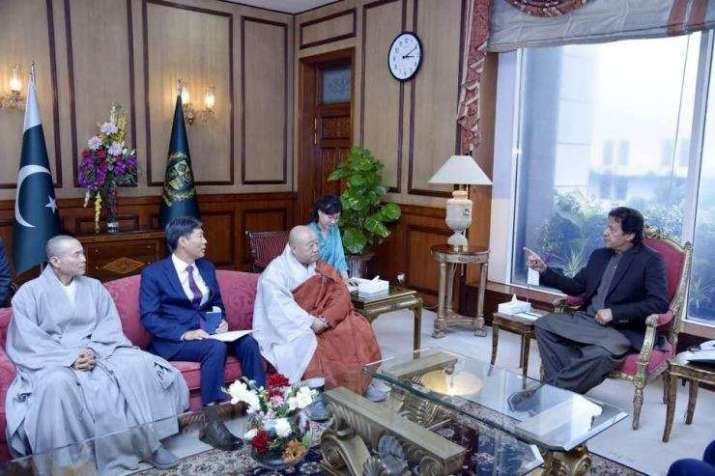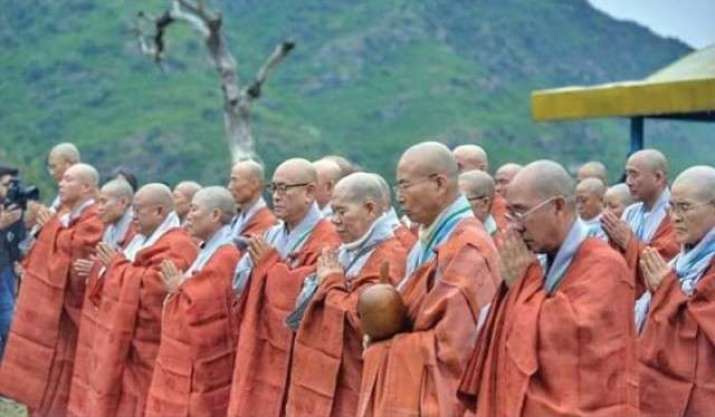
The government of Pakistan has given authorization for the Jogye Order of Korean Buddhism, South Korea’s largest Buddhist order, to establish a Buddhist temple at one of Pakistan’s ancient Buddhist heritage sites. The decision stems from the recent visit to Pakistan by a monastic delegation from Korea led by Venerable Wonhaeng, head of the Jogye Order.
Ven. Wonhaeng, the 36th president of the Jogye Order, elected to a four-year term in October 2018, led a monastic delegation on a visit to Pakistan from 16–24 November.
“I was deeply moved when I first stepped into Pakistan because it is the home country of the Ven. Marananta [Malananda, fl. fourth century CE], who brought Buddhism to Korea about 1,600 years ago,” Ven. Wonhaeng said during a Buddhist ceremony in Seoul after returning from Pakistan. “I was touched when I thought of him, who toiled to come all the way to East Asia against all the odds to spread Buddhism.” (The Korea Times)
Malananda was a Buddhist monk from Gandhara, an ancient region in the northwest of the Indian subcontinent, in what is now northwest Pakistan and northeast Afghanistan. He was among the first people to bring Buddhism to the Korean Peninsula, and the first to bring the spiritual tradition to the kingdom of Baekje (18 BCE–660 CE; one of the Three Kingdoms of Korea, together with Goguryeo and Silla) in southwestern Korea.
During the tour, the 60-member delegation of monastics and Buddhist pilgrims visited a number of historic Buddhist sites, as well as the Lahore Museum, home to an impressive collection of Greco-Buddhist sculptures and Mughal and Pahari paintings.
Ven. Wonhaeng’s visit to Pakistan also included private meetings with the prime minister, Imran Khan, and President Arif Alvi in Islamabad. Khan said that he had authorized the construction of a temple linked to the Jogye Order at one of the country’s Buddhist heritage sites, while President Alvi observed that as the cradle of many civilizations, the visit to Pakistan by the Buddhist delegation would convey a message of peace, harmony, and understanding among all religions.
“I was impressed by the Pakistani government’s ceaseless efforts to preserve historic sites having a trace of Buddhism,” said Ven. Wonhaeng. (AsiaNews.it)
During his meeting with President Alvi, Ven. Wonhaeng noted Korean Buddhism’s centuries-old relationship with Pakistan began with Ven. Malananda’s journey to Baekje, and was cemented by the Korean monk Hyecho (704–787), who traveled to Chitral and Swat in what is now Pakistan.
“I thank the Pakistani people and government for their efforts to preserve Buddhist sites and historic relics and hope that our recent visit can trigger and continue further cooperation between the two sides in the next 1,000 years,” said Ven. Wonhaeng, who noted that the visit to Pakistan would also encourage the recovery and preservation of Buddhist sites and relics. (The Korea Times)

The Jogye Order is a school of Seon (Zen) Buddhism that traces its roots back 1,200 years to the Unified Silla (also known as the Later Silla) kingdom (668–935). The Jogye school as a distinct entity emerged in the late 11th century when the monk Bojo Jinul, credited as the school’s founder, sought to combine Seon practices with the theological underpinnings of sutra-based Buddhist schools, including Korean Pure Land Buddhism. The order now represents the largest segment of South Korea’s Buddhist population, administering about 1,900 active temples and more than 13,000 monastics and seven million lay followers nationwide.
According to census data for 2015, the majority of South Korea’s population—56.1 per cent—holds no religious affiliation. Christians make up the largest religious segment of the population at 27.6 per cent, while Buddhists account for 15.5 per cent. In Pakistan, Buddhists are estimated to number just 1,500, according to data for 2012, out of a population of some 212 million people.
See more
A Buddhist temple to boost the friendship between S Korea and Pakistan (AsiaNews.it)
Buddhist leader calls Pakistan visit ‘spiritually stimulating’ (The Korea Times)
Korean monks in city for ‘spiritual peace’ (The Express Tribune)
Korean monks visit religious sites (The Express Tribune)














